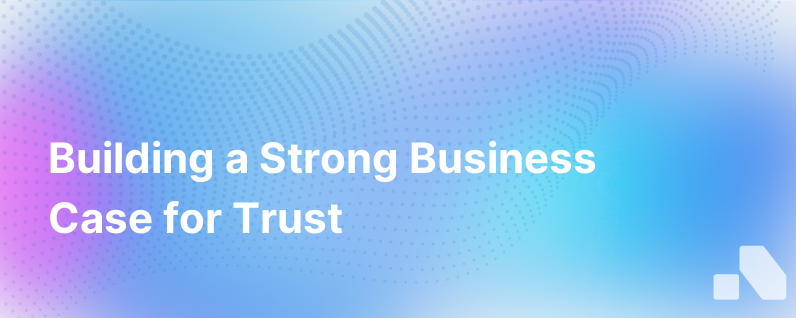The Business Case For Trust
Published on August 24, 2023 by Sawyer Middeleer
In the modern business ecosystem, trust is not merely a soft value; it is a pivotal asset that can significantly enhance an organization's financial performance, brand reputation, customer loyalty, and employee engagement. It's the invisible currency that enables businesses to navigate these dynamic and often volatile commercial waters. Hence, establishing a business case for trust is imperative in crafting any business strategy.
In this article, we'll dive into why trust should be at the forefront of your business goals, the measurable benefits of trust, and how companies can harness and quantify its power.
Understanding the Financial Impact of Trust
At first glance, trust seems intangible and qualitative. However, its impact can be measured in ways that resonate with the most hard-nosed finance teams. For instance, the Edelman Trust Barometer regularly demonstrates a correlation between high levels of trust and stock market performance. Companies that cultivate trust with stakeholders often enjoy lower volatility in their stock prices, resilience in times of market stress, and a cost of capital that's demonstrably lower than their peers.
Trust Enhancing Customer Loyalty and Retention
Customer acquisition costs are soaring. In this landscape, trust can act as a magnet for customer retention. A PwC survey found that one in three customers will leave a brand they love after just one bad experience, while 92% would completely abandon a company after two or three negative interactions. Conversely, when trust anchors the customer relationship, they are more forgiving and more likely to return. This retention bolsters lifetime value and profit margins. Trusted companies outperform competitors by nearly 3x the revenue due to repeat business from loyal customers.
Trust as a Differentiator in B2B Sales
In a B2B context, trust is even more critical – the sales cycles are longer, and the financial stakes are higher. A study by LinkedIn showed that trust is the number one factor in closing deals. Beyond product features or pricing strategies, if a prospect trusts your company, they are more likely to become a customer. The significance here cannot be understated; it's the bedrock of your business growth.
Trust and Employee Engagement
Trust also has profound implications internally. Employees who trust their employers are more engaged, loyal, and productive. A study by Great Place to Work Institute found that companies with high-trust cultures outperform those with low-trust cultures by up to three times. Moreover, high-trust environments encourage innovation and risk-taking, essential for maintaining a competitive edge.
Trust Reducing Recruitment and Turnover Costs
When team members trust their leaders and organization, it reflects in lower turnover rates. The cost of replacing an employee can range from tens of thousands of dollars to 1.5-2x the employee's annual salary. Creating a high-trust culture internally can dramatically reduce these costs and foster a more stable, competitive, and innovative corporate environment.
Trust Enhancing Corporate Social Responsibility (CSR)
As public consciousness evolves, trust is increasingly linked to ethical behavior and social responsibility. Companies perceived as trustworthy are more likely to garner customer support and advocacy. The 2020 Zeno Strength of Purpose Study showed that consumers are four to six times more likely to purchase, protect, champion, and trust companies with a strong purpose.
Measuring Trust
For those accustomed to quantitative measures, trust can be somewhat elusive to capture. However, several metrics can help gauge trust within and towards an organization.
Net Promoter Score (NPS)
A high Net Promoter Score – where customers are not just satisfied but enthusiastic enough to recommend your services – is a clear indicator of trust in your brand.
Employee Turnover Rate
A low employee turnover rate can be a proxy for internal trust. It demonstrates that employees believe in the company's direction and feel valued and heard.
Customer Churn Rate
Lower churn rates can indicate a loyal customer base that trusts your product or service will consistently meet their needs.
CSR Ratings
Ratings from organizations that evaluate corporate social responsibility can serve as a barometer for external trust – how much your customers and the public trust that you're operating ethically and responsibly.
Building a Trust-Centric Business
Implementing a trust-centric business model requires strategic investments in several areas:
- Transparent Communications: Whether it's being honest about product capabilities or keeping customers up-to-date on company challenges, transparency is key.
- Customer Service Excellence: Prioritizing customer success builds trust and strengthens relationships.
- Employee Empowerment and Well-Being: Employees who feel cared for and valued are likely to reciprocate and propagate trust internally and externally.
- Ethical Business Practices: Aligning with ethical business practices strengthens trust with all stakeholders and potentially shields the business from legal risks.
- Consistent and Reliable Products/Services: Quality control and consistency ensure that customers learn to rely on your offering.
Conclusion
The business case for trust is unassailable: it transcends industries, imbues resilience, and cements long-term prosperity. In an environment where disrupting trust is just one social media post away, companies must be ever vigilant and proactive in their trust-building endeavors.
Above are compelling reasons to prioritize trust as a critical KPI – as equally important as revenue or profitability. Empowering your strategy with a culture and operational ethos steeped in trust is not just the ethical choice; it’s the strategic one for sustained business success.
And as businesses continue to navigate increasingly complex sale environments, platforms like Aomni could provide a vital support system – ensuring that the message relayed to potential clients is not just compelling but also rooted in a foundation of trust and backed by a promise of value.